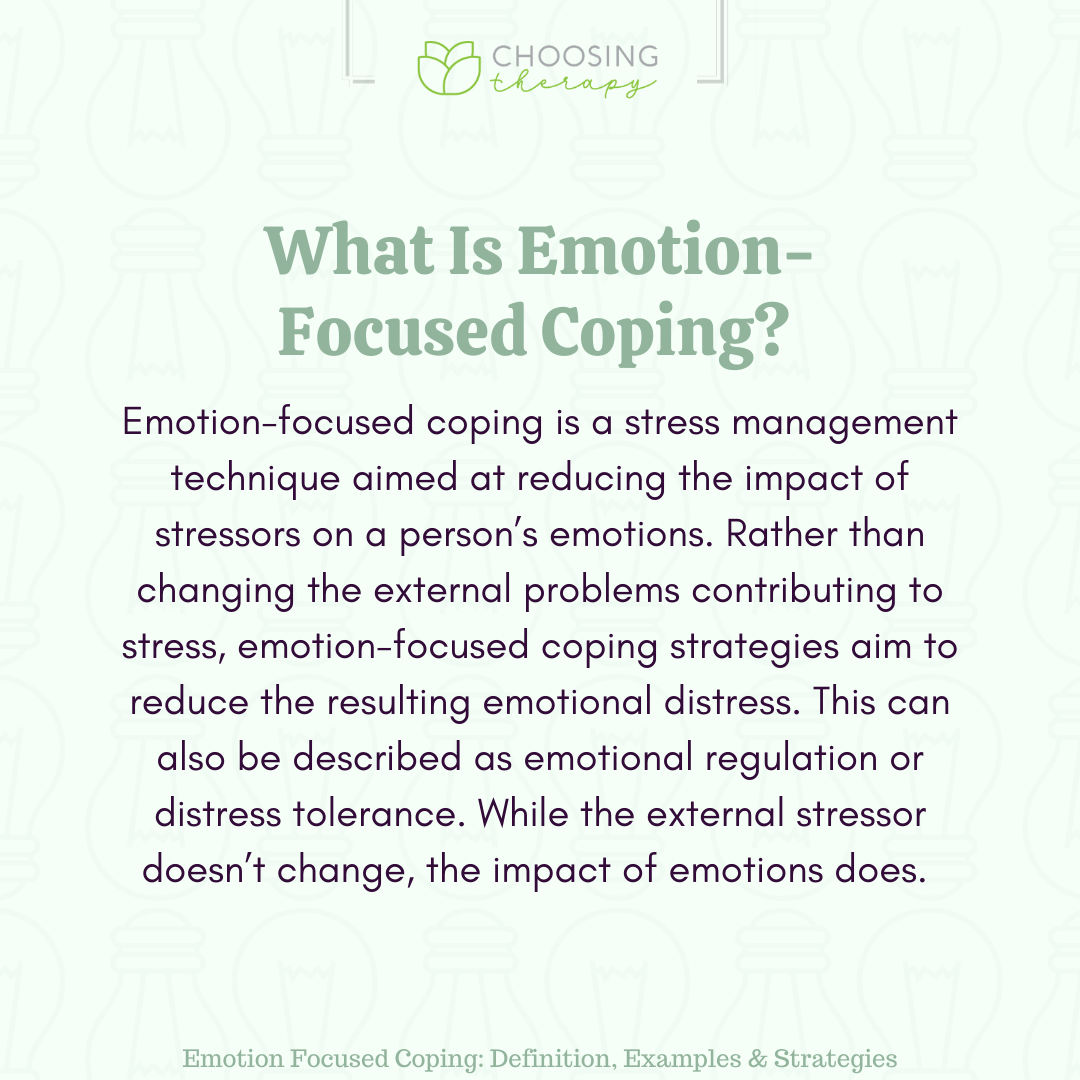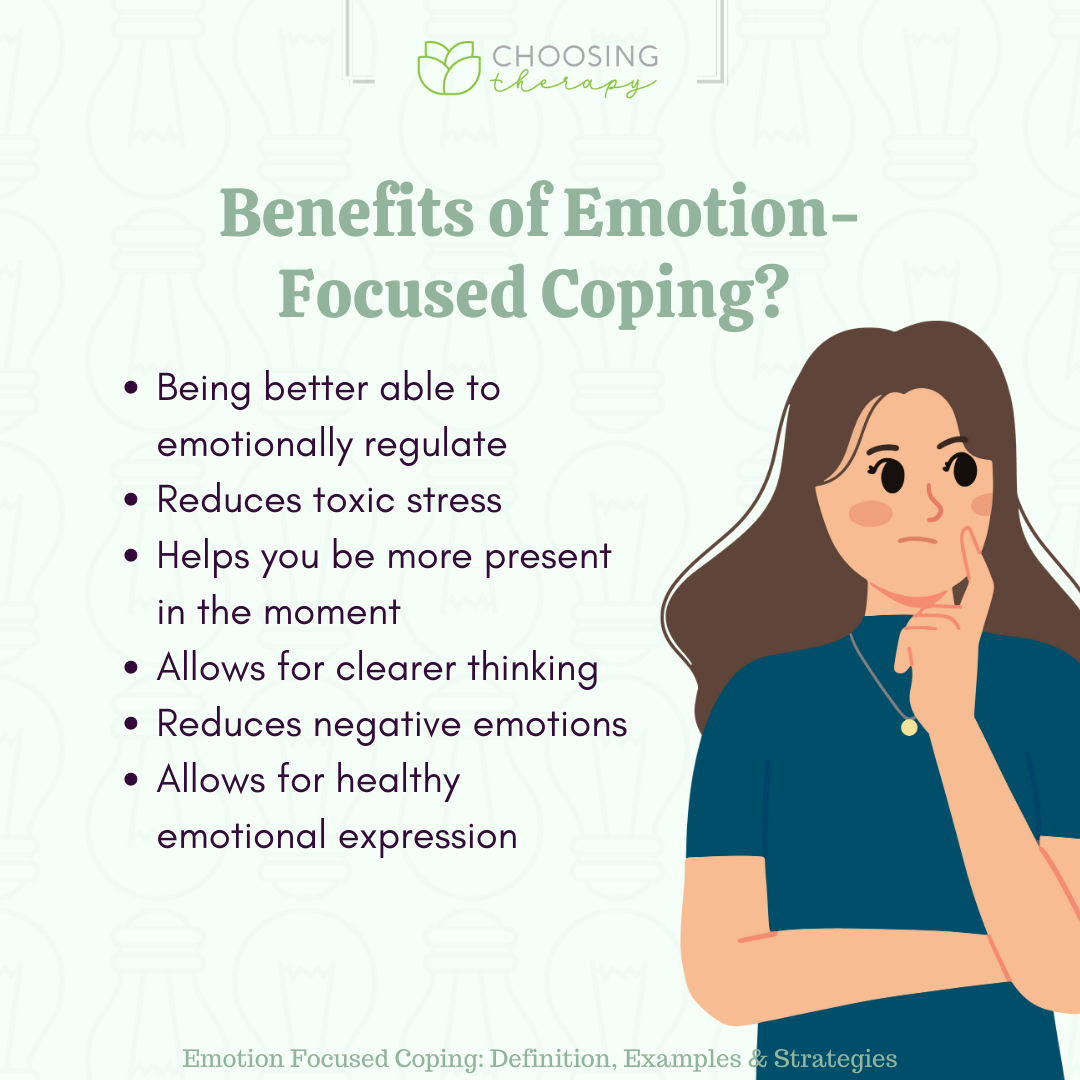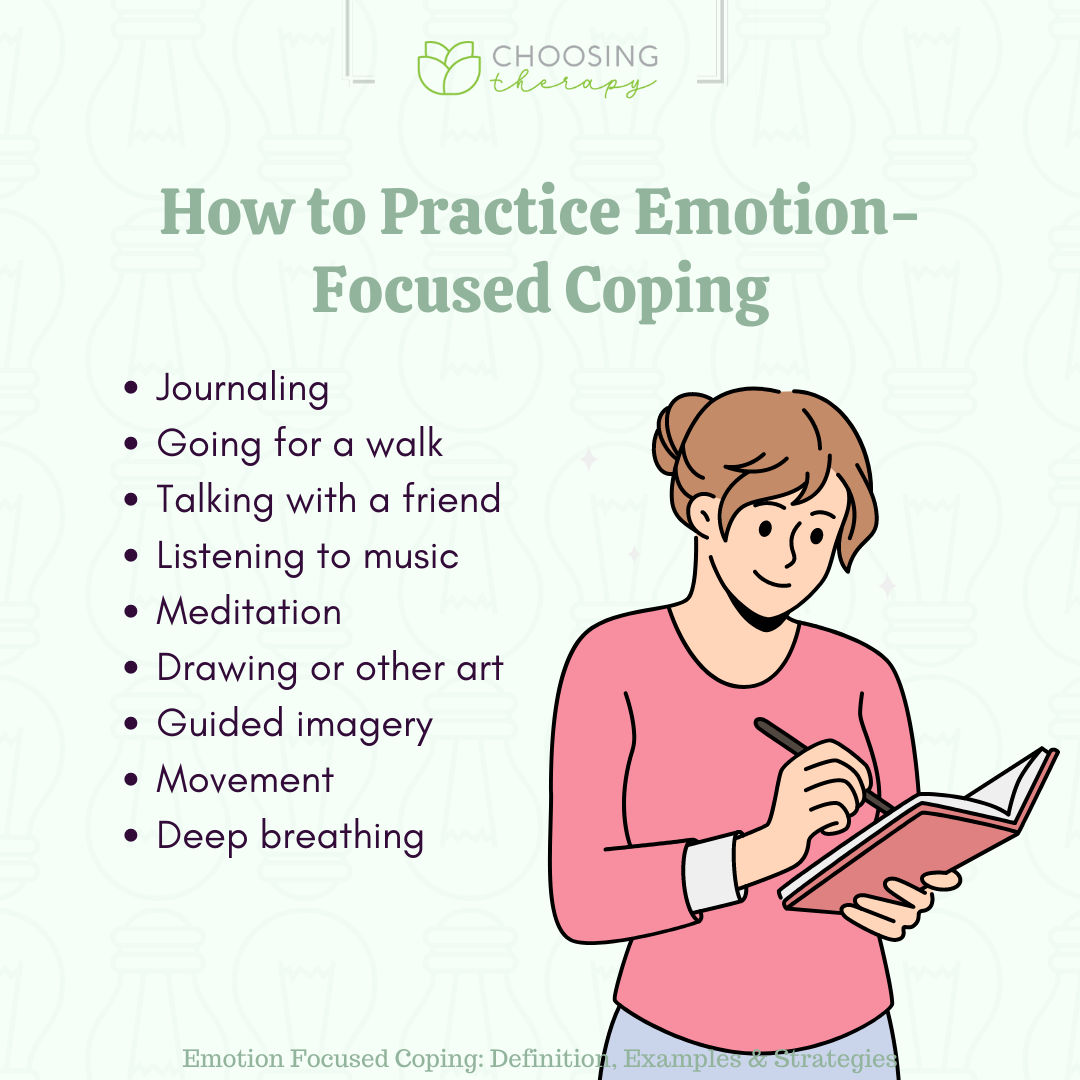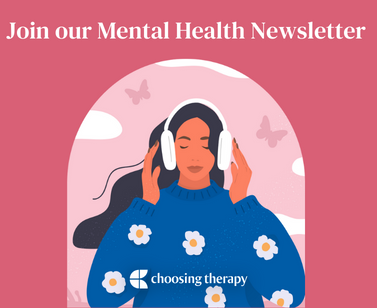Emotion-focused coping refers to using skills for processing and dealing with feelings that arise due to stressful situations. It utilizes inward-facing strategies, including meditation, journaling, and breathing techniques, to reduce distress and regulate emotions. Unlike problem-focused coping, which deals with changing external stressors, emotion-focused coping skills are intended to reduce internal emotional distress.1
Do your emotions feel extreme?
Therapy can help you be less reactive and calmer. BetterHelp has over 20,000 licensed therapists who provide convenient and affordable online therapy. BetterHelp starts at $65 per week. Take a Free Online Assessment and get matched with the right therapist for you.
What Is Emotion-Focused Coping?
Emotion-focused coping is a stress management technique aimed at reducing the impact of stressors on a person’s emotions. Rather than changing the external problems contributing to stress, emotion-focused coping strategies aim to reduce the resulting emotional distress. This can also be described as emotional regulation or distress tolerance. While the external stressor doesn’t change, the impact of emotions does.
Emotion-focused coping can be used in an adaptive or maladaptive way. When used adaptively, such as with journaling, meditation, or breathing techniques, emotion-focused coping is a very effective tool for reducing the negative impact of stressors and regulating emotion. However, when used in a maladaptive way, such as with denial, avoidance, or toxic positivity, emotion-focused coping is not as helpful.1
Emotion-Focused Coping Vs. Problem-Focused Coping
Emotion-focused coping refers to those coping tools that are intended to reduce emotional distress rather than changing the actual situation. Emotion-focused coping can help people regulate their emotions, stay calm, reduce anxiety, or cultivate positive emotions. An example would be a person who is stressed by changes at work so they go for a walk, journal about it, and practice taking deep breaths.
On the other hand, problem-focused coping is intended to change the external stressors contributing to the stress. This type of coping includes taking action and creating constructive solutions and strategies to change the situation. Problem-focused coping is more external and seeks to solve problems rather than change one’s emotional state relating to those problems.2
Benefits of Emotion-Focused Coping
Emotion-focused coping can help someone become more calm, centered, and grounded. Regulating emotions can allow the executive functioning parts of one’s brain to take over, allowing the person to think clearly and strategically. This type of coping enables a person to take charge of their emotional state and regulate their emotions and mood so they can experience less sadness, anxiety, depression, and stress.
Benefits of emotion-focused coping include:
- Being better able to emotionally regulate: Emotion-focused coping can help with emotional regulation by allowing a person to process through and decrease difficult emotions.
- Reduces toxic stress: By regulating emotions like anxiety, anger, and frustration, one can decrease the levels of stress-related hormones such as adrenaline and cortisol. These hormones can be dangerous over time and contribute to health problems.3
- Helps you be more present in the moment: Mindfulness, one of the more common types of emotion-focused coping, helps with attention and awareness of the present moment without judgment. Staying in the moment can help reduce the effects of stress and overwhelm.
- Allows for clearer thinking: When a person is emotionally dysregulated, the emotional part of the brain, known as the limbic system, takes over, and the part that is responsible for critical thinking, the pre-frontal cortex, goes offline. Emotional regulation helps activate the executive center in the brain, allowing for more clear and focused thinking and problem-solving.4
- Reduces negative emotions: Negative emotions like sadness and anger are healthy and a normal part of life. However, getting stuck in those emotions over the long term can become unhealthy, and processing those emotions can pave the way for more positive emotions to emerge.
- Allows for healthy emotional expression: Emotion-focused coping tools like journaling or talking things through with a good friend are healthy ways to process, feel, and move through emotions.
Top Rated Online Therapy Services
BetterHelp – Best Overall
“BetterHelp is an online therapy platform that quickly connects you with a licensed counselor or therapist and earned 4 out of 5 stars.” Visit BetterHelp
Online-Therapy.com – Great Alternative
In addition to therapy, all Online-Therapy subscriptions include a self-guided CBT course. Visit Online-Therapy.com
How to Practice Emotion-Focused Coping
Emotion-focused coping strategies work by allowing a person to regulate their emotions. Anytime someone finds that their emotions are getting in the way of their ability to be productive, present, or successful, or when emotional responses are causing problems at work, school, or in relationships, emotion-focused coping skills can help.
Here are nine emotion-focused coping strategies to try:
1. Journaling
Journaling is a great tool for emotion-focused coping because it allows someone to not only get their emotions out of their mind and body onto the page but it can also help them to process and come up with possible solutions. Even just simply a “brain dump “, writing down everything that’s on your mind, can be helpful for reducing stress.
2. Going for a Walk:
Many people find going for a walk to be a great way to regulate emotions. There are so many benefits to walking, including getting some movement, getting out into some fresh air, and getting some light are all ways to boost mood. If you are able to walk in nature, that can have even more benefits.
3. Talking With a Friend
Some people find it most helpful to process their feelings emotionally. Just the act of talking it out with a trusted friend or support person can start to relieve difficult emotions.
4. Listening to Music
Music has the power to influence mood. Listening to music that matches your mood, for instance, listening to a sad song when you are feeling sad, helps amplify and process your emotions. Another strategy is to listen to music that has the opposite emotion from what you are feeling. For example, if you are feeling sad, listen to a happy song.
5. Meditation
There are many different types of meditation, from sitting in silent meditation to walking meditation to following along with a guided meditation. Try some different types and notice which ones are the most helpful for you.5
6. Drawing or Other Art
Drawing can help you express emotions in a creative way, and sometimes art can express what words can not. Try grabbing some pens, markers, or paint and start putting your emotions into a piece of artwork.
7. Guided imagery
Guided imagery is a great way to cultivate feelings of calm and other positive emotions. There are many helpful guided meditations available online.
8. Movement
Getting up and moving your body can be another great way to process emotions and shift your emotional state. This can look like an exercise, Tai Chi, yoga, or other class, stretching, going for a walk, or dancing in your living room!6
9. Deep Breathing
Taking a few deep breaths really works to calm stress and anxiety. There are many different types of breath practices available, including alternate nostril breathing, 4-7-8 breathing, and visualization. A deep breath followed by a long exhale has been found to be especially helpful in reducing stress.7
Combining Emotion-Focused Coping & Problem-Focused Coping
The most productive way to deal with life stressors is through a combination of emotion-focused and problem-focused coping strategies. Emotion-focused coping can help someone be more calm and present, think more clearly, keep a level head, and communicate more effectively. From this more grounded emotional state, one can engage in problem-focused coping to change the situation.
Emotion-focused coping alone isn’t enough. No amount of deep breathing will change a toxic workplace culture or make an unsustainable schedule healthy. But what it can do is put someone in the right frame of mind to start problem-solving and taking action. Regulating emotions first, then strategizing ways to solve the problem, is a great way to change the situation both internally and externally.
When to Seek Professional Support
When toxic stress starts to take a toll on sleep, mood, appetite, or relationships, this can be a sign that it may be time to seek out professional help. This is especially true if one has tried different coping skills and found them unhelpful. When stress becomes prolonged or chronic, it can lead to burnout, which can include feelings of dread, a cynical outlook, loss of motivation, and lowered productivity.
There are several effective types of therapy for stress. Mindfulness is a great tool for reducing stress and anxiety, and mindfulness-based stress reduction programs are a good option. Dialectical behavior therapy (DBT) helps with distress tolerance and many therapist will use compassion-focused therapy techniques. An online therapist directory or online therapy platform are good choices for a therapist who specializes in emotion-focused coping and other stress management techniques.
In My Experience
Both emotion-focused and problem-focused types of coping can be highly effective. In my work as a trauma therapist, I utilize emotion-focused coping skills, often including mindfulness, guided imagery, and breathing techniques. Using these tools allows clients to regulate their emotional state as well as their nervous system, which can make them more equipped to tolerate the stress of trauma therapy.
I think that using the two-part approach, emotion-focused coping to help regulate emotions, and then problem-focused strategies like taking action and making changes is the best approach. Emotion-focused coping skills do not work when a person goes right back into an unhealthy, stressful situation, so once the emotions are managed, it is also important to change the systems that contribute to stress.
Additional Resources
To help our readers take the next step in their mental health journey, Choosing Therapy has partnered with leaders in mental health and wellness. Choosing Therapy is compensated for marketing by the companies included below.
Online Therapy
BetterHelp Get support and guidance from a licensed therapist. BetterHelp has over 20,000 therapists who provide convenient and affordable online therapy. Complete a brief questionnaire and get matched with the right therapist for you. Get Started
Online Psychiatry
Hims / Hers If you’re living with anxiety or depression, finding the right medication match may make all the difference. Connect with a licensed healthcare provider in just 12 – 48 hours. Explore FDA-approved treatment options and get free shipping, if prescribed. No insurance required. Get Started
Reduce Drinking
Sunnyside Want to drink less? Sunnyside helps you ease into mindful drinking at your own pace. Think lifestyle change, not a fad diet. Develop new daily routines, so you maintain your new habits for life. Take a 3 Minute Quiz
Mental Health Newsletter
A free newsletter from Choosing Therapy for those interested in mental health issues and fighting the stigma. Get helpful tips and the latest information. Sign Up
Online Anxiety Test A few questions from Talkiatry can help you understand your symptoms and give you a recommendation for what to do next. How Does ERP Help With Intrusive Thoughts? Obsessive compulsive disorder (OCD) is a psychiatric condition marked by the presence of obsessive thoughts, images, doubts, or urges, followed by compulsive behaviors or acts aimed at easing the distress caused by the obsession. While the content of the obsessions can take many forms, they are always repetitive, persistent, involuntary, and intrusive, and they often result in a great deal of anxiety for the person experiencing them.








